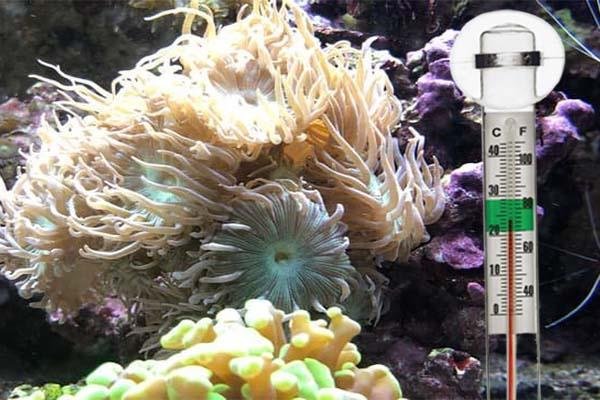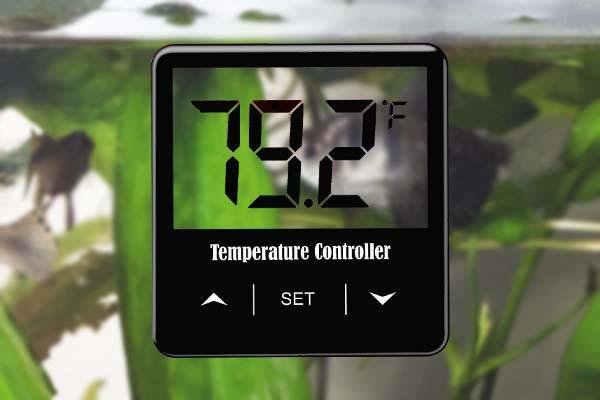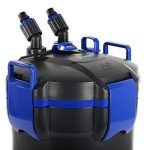Reef Tank Temperatures Range: This Is What The Ideal Temperature For A Reef Tank Is

The ideal temperature for a reef tank ranges from 76°F to 84°F. Higher temperatures will stress corals and make them difficult to grow. Lower temperatures can inhibit photosynthesis, which means corals won’t get what they need to survive.
During the past few decades, reef aquariums have become one of the most popular home décor items. The ability to create a living masterpiece in our own homes is captivating for many people. We enjoy the hobby because it is a creative outlet and a window into a fascinating world that we would otherwise never see. With this being said, it’s important to understand that reef aquariums require a specific temperature range to do well. So, what should be the reef tank temperature range?
A reef tank is the most enjoyable environment for any marine life. Fish are often seen swimming in a large body of water with many different types of sea life. The idea is to replicate this environment in your home, but it can be not easy to get the temperatures just right. The perfect temperature for your reef tank depends on what types of fish and coral you want in your aquarium.
Why is temperature important for a Reef Tank?
Fish are ectotherms, meaning they live off their environment to regulate body temperature. This is usually achieved by taking in water with a lower or higher pH which will cause the fish to have an acidic or alkaline pH, respectively. This change in pH can be detected by cells on the surface of the fish’s body called monocytes.
You don't want your expensive and beautiful coral to die because of a mistake that's easily avoided: check out our guide for keeping your tank at the ideal temperature
The article below will explore why temperature is important for fish tanks and the ideal temperature ranges.
The Effect of Temperature on Fish:
Fish are cold-blooded animals, which means that their internal body temperature matches the water in their environment. Fish are highly heated sensitive and suffer serious injury if they are not kept within a fairly narrow range of around 75 degrees Fahrenheit, although some fish are more flexible than others. The ideal reef tanks should be heated to 82 degrees Fahrenheit for an aquarium with live rock and invertebrates or 77 degrees Fahrenheit for a marine fish-only tank.
The Effect of Temperature on Plants:
Many different factors can affect how a plant grows, including the amount of light it receives, soil type, and even temperature. Temperature can be measured in degrees Fahrenheit or Celsius. There is an optimal temperature range for each type of plant to grow properly. For example, some plants will not thrive in high temperatures. The ideal temperature for a reef tank is between 78-88 degrees Fahrenheit.
Temperature is essential for corals to grow and reproduce
The warm waters of the Caribbean have been a haven for coral growth and reproduction for centuries. Coral reefs provide a breeding ground not just for corals but also for all kinds of other ocean life, including fish, crustaceans, and mammals. The ecosystem is so delicate that it will be hurt if the water temperature or pH changes too much.
Temperature affects the inhabitants of a saltwater aquarium
A wide variety of organisms inhabits saltwater aquariums. The temperature of the water is a major factor in the health and happiness of these inhabitants and how they interact with one another. So, what is the ideal temperature for a reef tank range?
Temperature determines the marine life that can inhabit an aquarium.
The water temperature is one of the most important factors to consider when setting up an aquarium. Certain fish species require colder temperatures than others, and some invertebrates will not survive in warmer water. The ideal temperature for a reef tank should be between 76-78 degrees Fahrenheit. When it is too hot, corals will bleach and may die. And when it’s too cold, some fish may become inactive or perish in a short period.
Temperature influences how much food corals need
Temperature is often overlooked in the aquarium hobby, but its importance cannot be underestimated. It influences how much food corals need, how fast they grow, and what type of animals will inhabit the reef. In a cold temperature environment, corals may not eat as much, and certain animals such as large predatory fish may not survive either. A reef tank needs an ideal temperature for corals to thrive and for life to exist.
Temperature influences how many light corals need
It’s been said that “temperature is the only factor to consider when trying to keep a reef aquarium.” This may not be entirely true. In recent studies, it has been discovered that corals can photosynthesize up to a point where the temperature becomes either too hot or too cold for them.
In one study, researchers found that species of coral from warmer climates were four times more likely to die due to increased water temperatures than those from cooler regions.
Too high or too low of a temperature could kill all of the inhabitants in a tank.
Knowing the ideal temperature for a reef tank range is important because too high or too low of a temperature could kill all of the inhabitants in the aquarium. Reef tanks are saltwater aquariums that are warm and sunny, making them perfect for animals near coral reefs. The temperature should be around 78 degrees Fahrenheit with no fluctuation day or night. This will provide fish and invertebrates with a consistent thermal environment. If not, they may become stressed, which could lead to death.
Reading the above points, hope we are clear on how tank temperature is an important factor for a healthy and happy reef tank. It is also important to monitor the temperature of your tank in order to make sure that everything is thriving well.
Reef tank temperature range: What Is The Ideal Temperature For A Reef Tank

A reef tank is a self-sustained ecosystem that requires the water temperature and pH levels to be within a certain range to thrive. The temperature and pH levels required by different fish and invertebrates vary.
Many factors determine the ideal temperature for your tank, such as the bio-load (how much waste each organism produces), type of lighting, size of the tank, and amount of circulation in the water.
How to Understand the Correct Tank Temperature for your Reef?
A reef tank should often be kept at 78 degrees Fahrenheit. But the truth is that the general rule of thumb is to keep the water within 4-6 degrees of the ambient room temperature. If your home’s room temperature ranges from 72-78 degrees, you should have your aquarium heater set between 74 and 76, depending on the season. The main goal in setting up your reef tank is to keep its water temperature as close to the ambient temperature as possible. However, this is easier said than done. So, to Choose the Correct water Temperature we have to understand the correct tank temperature.
Understanding the Impact of Heat on Coral Decalcification Rates
Coral reefs are one of Earth’s most important ecosystems. Coral reefs provide a habitat for 25% of all marine species and play a key role in maintaining global oceanic salinity.
The impacts of climate change on coral reefs are not limited to ocean acidification and include sea surface temperature rise, which alters the rate at which corals dissolve. Corals lose their skeletal structure and become vulnerable to disease, predation, and bleaching as corals dissolve.
Temperature Stability & Maintaining Proper Conditions
A reef tank’s temperature needs to be stable for delicate corals and shrimp to thrive. A wide range of temperatures can work well, but each type of coral and soft coral will vary in its ideal temperature.
Reef tanks are among the most difficult types of fish tanks to maintain, but the difference in the proper temperature range for a reef tank may make it easier. The difference in temperature ranges is due to the different types of fish and invertebrates in reef tanks. Reefs thrive in water with temperatures ranging from 72-82 degrees Fahrenheit, while too cold or too warm water can cause major problems for these delicate ecosystems.
Reef tank temperature range & Regulation
It’s the little things that count. It can be hard to know what is best for your system when it comes to reef tank temperatures. Different species have specific temperature preferences, and every aquarium has different water chemistry. Reef tanks are home to various marine life that thrive in their temperatures. You’ll need to find the perfect temperature range for your system, from corals to invertebrates and even fish.
The regulation of temperature for a reef tank can impact the type of corals and life the tank will support. Generally, water temperatures on the lower end of the spectrum (70-80 degrees) are more compatible with hardier species like LPS (large polyp stony) corals. Those with cooler water (low temperature 65-75 degrees) are better for SPS (small polyp stony) corals.
A reef aquarium requires a constant temperature range between 72-82 degrees Fahrenheit. If the temperature fluctuates, algae will grow faster than your corals consume. This causes the algae to start to accumulate and form a major problem. Studies have shown that a 1-degree temperature drop can cause algae to grow by 20%. A 1-degree increase can cause the algae to die off. The temperature needs to be constant to prevent this from happening.
In addition, the water must also be well aerated.
Conclusion & Re-Cap:
Many different points need to be considered before selecting the right temperature. This is not always an easy decision because many factors can lead you to the wrong conclusion. For example, a higher temperature might seem like a good idea, but it could induce stress in the fish. You need to have a well-balanced water system and conclude that you are comfortable with it. The most important thing is that you can look after the fish in your tank. The next point is to consider what temperature you require for the fish in your tank.
Before end-up, let’s have a re-cap of this full article-
RE-CAPS:
- The temperature is an important factor in ensuring the health of our reefs.
- Some reefers like to keep their tanks running at higher temperatures, some like it colder, and some like warmer water with a more stable temperature.
- Following the three-step rule will help determine whether you want to create a fishless or reef tank. The three-step rule is about finding the perfect temperature for your tank, adding live rock, and finally choosing your corals.
- Maintaining a balance in the temperature of the aquarium water is the first thing. Then you can focus on the other areas of your reef.
- The temperature of a reef tank is one of the most important aspects to consider when setting up your tank. This means that they need to decide what range of temperatures they want their tank to be in for most people. Experts have said that the best temperature for a reef tank is between 72°F and 82°F, but some say that 76°F is optimal.
- A typical reef tank temperature ranges from 78-82 degrees Fahrenheit. Many corals grow the fastest at this temperature and will also thrive with the most protein production. This temperature range is generally recommended for aquatic life like fish and shrimp.
A single degree can make all the difference in your tank’s comfortability and colonization progress. There are minor differences in what temperatures work best depending on the type of coral and fish you keep in your tank.
Hopefully, this article has helped to understand the perfect and ideal temperature for the reef tank range. Thanks for reading!
If you looking for a guide to the Best Nano Reef Tanks, You are welcome to read this review article. I am sure, you will like them.


